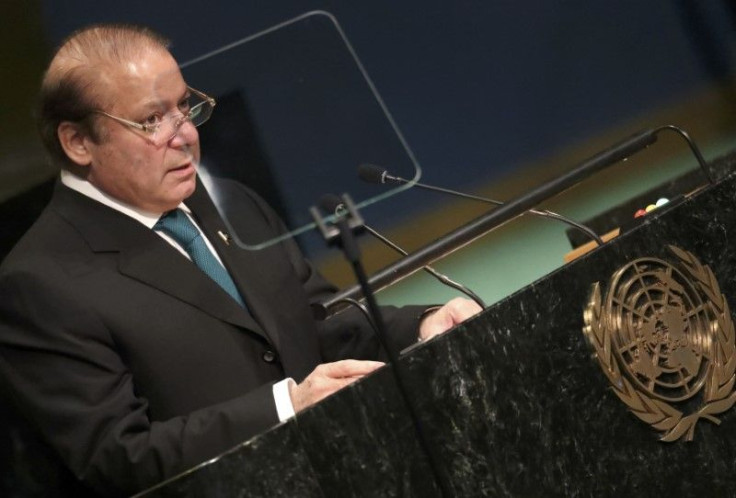Pakistan's Sharif Says World Ignores South Asia Tensions At Its Peril

Pakistani Prime Minister Nawaz Sharif accused nuclear-armed rival India on Wednesday of putting unacceptable conditions on dialogue with Islamabad and said the world would ignore the dangers of rising tensions in South Asia at its own peril.
Sharif told the annual United Nations General Assembly Pakistan could not ignore India's "unprecedented" arms build-up and would "take whatever measures are necessary to maintain credible deterrence."
India has accused Pakistan of being behind a deadly attack on an army base in the disputed Kashmir region on Sunday in which 18 soldiers were killed and said it had the right to respond when and where it chose.
Pakistan has rejected the allegation and accused India of apportioning blame before the incident had been investigated properly.
Sharif said Pakistan wanted peace with India and had repeatedly offered dialogue.
"But India has posed unacceptable preconditions to engage in dialogue," he said. "Talks are in the interests of both countries. They are essential to resolve our differences, especially the Jammu and Kashmir dispute, and to avert the danger of any escalation."
India has long accused Pakistan of playing a role in the 27-year-long insurgency against its rule in Jammu and Kashmir, its only Muslim-majority state. Pakistan denies sending fighters into Indian-administered Kashmir.
New Delhi has said it would only discuss terrorism-related issues, whereas Pakistan wants a wider agenda that would, among other things, discuss the Kashmir question.
Kashmir, divided between India and Pakistan since 1947, is at the heart the neighbors' seven decades of mutual distrust. Two of their three wars since independence from Britain have been fought over the region.
India's portion of Kashmir has been under a major security lockdown during more than two months of protests sparked by the July 8 killing of a popular young commander of a Kashmiri militant group.
Sharif repeated a Pakistani call on the United Nations and the international community to investigate atrocities it alleges have been committed by Indian security forces in Kashmir.
"The international community ignores the dangers of rising tensions in South Asia at its own peril," he said.
India rejected Sharif's remarks in a statement to the U.N. General Assembly from Eenam Gambhir, a senior diplomat at its U.N. mission.
"It is ironical ... that we have seen today the preaching of human rights and ostensible support for self-determination by a country which has established itself as the global epicenter of terrorism," she said.
She said Sunday's attack was "part of a trail of continuous flow of terrorists trained and armed by our neighbor" and tasked to carry out attacks in India.
"What we see in Pakistan ... is a terrorist state, which channelizes billions of dollars, much of it diverted from international aid, to training, financing and supporting terrorist groups as militant proxies against it neighbors," she said.
© Copyright Thomson Reuters {{Year}}. All rights reserved.





















